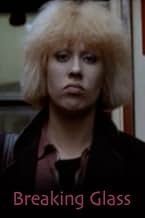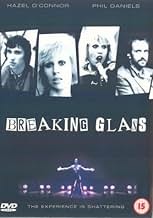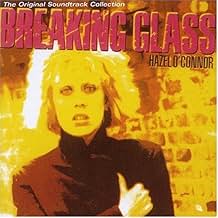Breaking Glass
- 1980
- Tous publics
- 1h 44m
IMDb RATING
6.8/10
1.7K
YOUR RATING
A rock singer is determined to rise to the top of the profession, letting nothing stand in the way of that goal.A rock singer is determined to rise to the top of the profession, letting nothing stand in the way of that goal.A rock singer is determined to rise to the top of the profession, letting nothing stand in the way of that goal.
- Nominated for 1 BAFTA Award
- 2 nominations total
Lowri Ann Richards
- Jane
- (as Lowri-Ann Richards)
- Director
- Writer
- All cast & crew
- Production, box office & more at IMDbPro
Featured reviews
I first came to breaking glass some years ago after having heard a track from the film. When I first watched it I thought it was shocking but after coming back to it years later I can see so much more in it. It's a truly excellent film depicting life in Thatcher's Britain as well as a wry view of the music industry. Hazel O'Conner is underrated in my view but she does excel here. Excellent film and even better soundtrack.
Breaking Glass is an excellent movie which has suffered from neglect and wholly inaccurate political associations. This movie was written and made in 1978 and 1979 and released in 1980. Therefore it couldn't possibly be: "A truly excellent portrayal of 80s Britain".Nor does it depict life in: "Thatcher's Britain".
In fact Breaking Glass depicts Callaghan's Britain, which was characterised by a deplorable catalogue of industrial disputes, strikes, high unemployment, and collapsing public services during the winter of 1978-9, dubbed the 'Winter of Discontent'.
What this movie is, is one of the best kept secrets in British cinema history. And although Hazel O'Connor enjoys second billing to Phil Daniels who had just done Quadrophenia to great acclaim, she is one of the greatest talents we've ever produced. Indeed, Hazel shines as the real star throughout, possibly drawing on her own personal experiences growing up in Coventry following the break-up of her parent's marriage, which lead to her running away to Europe at the age of 16.
I saw this film in the cinema the week it was released in the UK and I was stunned by both Hazel's singing and acting talent as well as that of the saxophonist superbly played (and dubbed) by Jonathan Pryce. That solo is a classic all on its own. Every feeling I felt at the time whilst watching this stark portrayal of human nature and the workings of the music industry has stayed with me until today.
In many ways Breaking Glass suffers from being too current. All stories of social history work best when set in the past. Quadrophenia worked because it spoke of a previous period of disruptive British history - 20 years in the past. Also, there was already an undercurrent of opposition to Thatcher, but the country the Conservatives inherited from Labour on 4th May 1979 was a wreck. So it was perhaps convenient for some to use it as a metaphor for the greed and excess that was in fact still yet to come.
See this movie and enjoy it for what it is: a landmark in British Cinema history and a brilliant one-off performance from everyone involved. And catch Hazel on the net, where she sells much of her music, and live on stage where she's still gigging.
In fact Breaking Glass depicts Callaghan's Britain, which was characterised by a deplorable catalogue of industrial disputes, strikes, high unemployment, and collapsing public services during the winter of 1978-9, dubbed the 'Winter of Discontent'.
What this movie is, is one of the best kept secrets in British cinema history. And although Hazel O'Connor enjoys second billing to Phil Daniels who had just done Quadrophenia to great acclaim, she is one of the greatest talents we've ever produced. Indeed, Hazel shines as the real star throughout, possibly drawing on her own personal experiences growing up in Coventry following the break-up of her parent's marriage, which lead to her running away to Europe at the age of 16.
I saw this film in the cinema the week it was released in the UK and I was stunned by both Hazel's singing and acting talent as well as that of the saxophonist superbly played (and dubbed) by Jonathan Pryce. That solo is a classic all on its own. Every feeling I felt at the time whilst watching this stark portrayal of human nature and the workings of the music industry has stayed with me until today.
In many ways Breaking Glass suffers from being too current. All stories of social history work best when set in the past. Quadrophenia worked because it spoke of a previous period of disruptive British history - 20 years in the past. Also, there was already an undercurrent of opposition to Thatcher, but the country the Conservatives inherited from Labour on 4th May 1979 was a wreck. So it was perhaps convenient for some to use it as a metaphor for the greed and excess that was in fact still yet to come.
See this movie and enjoy it for what it is: a landmark in British Cinema history and a brilliant one-off performance from everyone involved. And catch Hazel on the net, where she sells much of her music, and live on stage where she's still gigging.
Hazel O'Connor is excellent and the movie is much more than just a musical. It reflects society as it was in the 'Thatcherite' era with it's excesses and prejudices. The storyline is believable and despite the low production cost, comes across very well. I would commend it to anyone. Hope that it is re-released on DVD.
It's almost impossible for me to be objective about this film. I first saw it in 1981 as a 12 year old drummer with stars in my eyes. I immediately begged my dad to get me the soundtrack on vinyl and was off memorizing the entire album. It is, by far, one of my favorite movies of all time. The story is decent, the acting is good, and the music is absolutely in tune with the period. The depiction of the music industry with it's main players often exploiting every new trend, sound and artist until it and they are completely exhausted is spot-on. What truly makes this film is the music. Each track is a perfect reflection of Kate's (Hazel O'Connor) journey and is pretty darn catchy to boot. (You'll be humming "Big Brother" for days.) I highly recommend this film, as have others in the forum, for anyone aspiring to be a musician for a living. It is a brilliant parable of having and maintaining control of your art and destiny.
Very much a political commentary on the disenfranchisement of youth and accurately summing up the feelings of the under 20s at that time, if not the reality.
The film was made just after the nation had suffered 'The Winter of Discontent' the final humiliation of the disastrous socialist government that had destroyed the aspirations and job prospects of a generation. This also led to the famous election of the far-right Thatcher government at the same time, but, they had not been in office for long enough to affect the approach of the film.
I saw the film at the time it was first shown, and being a punk and having a father that was a trade union leader at the time, much of what was portrayed in the film was familiar to me.
Although the film was very much trying to be a 'grim Northern realism' film for the 80s (and set in the south at that!), it was pure fantasy - things were never that bad, and it's easy to get depressed about situations that are portrayed as every-day occurrences that either never happened or were rare. The scenes of race riots are particularly overstated.
The music of the film, however, is it's strongest area. It is absolutely of its time, and completely representative. It is so classic that "In the beginning..." was being played in a country pub that I was in only last week (9/99) nearly 20 years later. What followed was 'New Wave' with 'Duran Duran' and others - what a disaster!
Given the slow degradation of the main character over the duration of the film, it is interesting to see what happened the the actress who played her (Hazel O'Connor) in real life. Life imitating art?
The film was made just after the nation had suffered 'The Winter of Discontent' the final humiliation of the disastrous socialist government that had destroyed the aspirations and job prospects of a generation. This also led to the famous election of the far-right Thatcher government at the same time, but, they had not been in office for long enough to affect the approach of the film.
I saw the film at the time it was first shown, and being a punk and having a father that was a trade union leader at the time, much of what was portrayed in the film was familiar to me.
Although the film was very much trying to be a 'grim Northern realism' film for the 80s (and set in the south at that!), it was pure fantasy - things were never that bad, and it's easy to get depressed about situations that are portrayed as every-day occurrences that either never happened or were rare. The scenes of race riots are particularly overstated.
The music of the film, however, is it's strongest area. It is absolutely of its time, and completely representative. It is so classic that "In the beginning..." was being played in a country pub that I was in only last week (9/99) nearly 20 years later. What followed was 'New Wave' with 'Duran Duran' and others - what a disaster!
Given the slow degradation of the main character over the duration of the film, it is interesting to see what happened the the actress who played her (Hazel O'Connor) in real life. Life imitating art?
Did you know
- TriviaThe movie was cut for its American theatrical release in the USA where approximately the last ten minutes and the ending were removed.
- Alternate versionsUS version lacks the ending with Kate in an asylum.
- ConnectionsFeatured in The 100 Greatest Musicals (2003)
- SoundtracksOne More Time
Sung by Victi Silva (as Victy Silva)
- How long is Breaking Glass?Powered by Alexa
Details
Box office
- Gross US & Canada
- $2,471
- Gross worldwide
- $2,471
- Runtime1 hour 44 minutes
- Color
- Sound mix
- Aspect ratio
- 2.35 : 1
Contribute to this page
Suggest an edit or add missing content



































